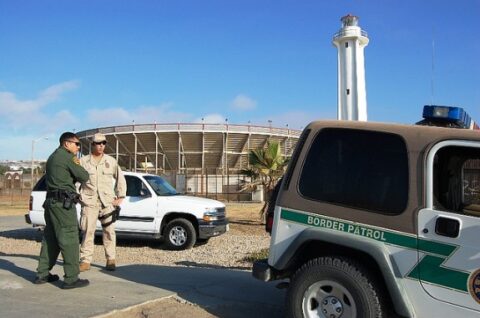Border Enforcement
Beyond A Border Solution
- Asylum
- May 3, 2023
America needs durable solutions. These concrete measures can bring orderliness to our border and modernize our overwhelmed asylum system. Read…
Read More
Border Patrol Agents Abusing Role as Interpreters
Over the past year, advocates in states along the northern border of the United States have reported that Border Patrol agents frequently “assist” local law enforcement officers by serving as Spanish-English interpreters and participating in 911 dispatch activities. Capitalizing on their access to noncitizens, Border Patrol agents are using these opportunities to facilitate immigration enforcement. This collaboration between Border Patrol and local law enforcement agencies, however, violates the letter and the spirit of federal language access requirements under Title VI of the Civil Rights Act of 1964 and Executive Order 13166, Improving Access to Services for Persons with Limited English Proficiency (August 11, 2000). Read More

Study Shows Self-Deportation is Irrational Behavior and a False Premise
Proponents of “attrition through enforcement” would have you believe that, given the right conditions, unauthorized immigrants will choose to leave the U.S. and return to their home countries. The Myth of Self Deportation, by Alexandra Filindra, questions the assumptions behind the attrition strategy and concludes that self-deportation is not rational because unauthorized immigrants have invested too much in the U.S. to return home. Read More

SB1070 Author Shares Fears About America Becoming a “Minority, Majority” Nation
On the same day the Supreme Court heard oral arguments in Arizona v. United States the Washington Post published an article featuring Michael Hethmon, general counsel for the Immigration Reform Law Institute. Hethmon is the lesser-known legal mind behind SB1070, and a variety of other anti-immigrant measures. His legal counterpart, Kris Kobach tends to get the spotlight; however Hethmon didn’t shy away from the Washington Post this week and was frank about his views on the real issues underlying SB1070. Read More

Nebraska Upholds Bill that Provides Prenatal Care to Undocumented Women
In a move that brought together an unusual group of allies, Nebraska’s Republican-controlled legislature recently upheld a bill that allows undocumented pregnant women to access state-funded prenatal care, overriding a veto by Republican Governor Dave Heineman. Nebraska Right to Life, Nebraska Catholic Conference, Planned Parenthood, and Nebraska Appleseed actually came together to support LB599, a bill the governor worked hard to kill. Why would Gov. Heineman, a man who describes himself as the one of the most pro life governors in America, oppose a bill that helps protect unborn children? Because, as the New York Times put it, he believes “government-financed health care for poor women is an acceptable thing, unless the women were in violation of immigration laws, in which case it was a terrible waste of taxpayer dollars.” Read More

DHS’s Current Southern Border Enforcement Strategy a Bust, Group Says
A comprehensive new report finds that the fortification of the U.S.-Mexico border which began two decades ago has reached the limits of its effectiveness, has produced severe negative side effects, and should be systematically re-evaluated. In Beyond the Border Buildup: Security and Migrants Along the U.S.-Mexico Border, the Washington Office on Latin America and the Colegio de la Frontera Norte argue that the U.S. border buildup has never been guided by a comprehensive security strategy. But now that unauthorized immigration has reached historic lows, says the report, the time is ripe to stop throwing money into fragmented enforcement efforts and determine precisely what those enforcement efforts are supposed to accomplish. Read More

Supreme Court Asks Hard Questions at Oral Arguments Over Arizona SB 1070
Almost two years to the day after Arizona enacted the notorious immigration law known as SB 1070, the Supreme Court heard arguments in what could be the first of many cases over the validity of the measure. Although most critics of the law have focused on its potential for civil rights violations, the only question before the Justices was whether federal immigration laws “preempt” four provisions of SB 1070 that were blocked by lower courts. While the ultimate fate of those provisions will not be known until a ruling is announced, a few preliminary observations can be made based on the questions posed by the Justices. Read More

Several Factors Cited for Drop in Net Migration from Mexico
Net migration from Mexico to the United States, both legal and illegal, now stands at zero—or less. In other words, the number of migrants coming here from Mexico is equal to, or less than, the number of migrants leaving or being deported from the United States and returning to Mexico. That is the main conclusion of a new report from the Pew Hispanic Center, which echoes last year’s findings by researchers in the Mexican Migration Project (MMP) at Princeton University and the Universidad de Guadalajara. The Pew report points out that this trend is the result of several factors, ranging from U.S. economic conditions to Mexican birth rates. The report also cautions that the trend could conceivably be reversed when the U.S. job market recovers and labor demand grows. Read More

Five Things to Know Before the Supreme Court Hears Arguments on Arizona SB1070
In less than 48 hours, the Supreme Court will hear oral arguments in Arizona v. United States, the long-anticipated dispute over the legality of SB 1070. More than any case in recent history, the dispute raises fundamental questions about the role of states in the enforcement of federal immigration law. The Court’s decision could thus determine not only the future of SB 1070, but the fate of other state immigration laws being challenged in court and the odds of similar laws being passed around the country. While much ink has already been spilled about the case, below we’ve highlighted five important facts to remember before the argument. Read More

Report Brings Border Patrol Abuses to Light in Washington State
The borderlands of the southwestern United States are not the only place where immigration enforcement tramples upon the most basic of civil and human rights. Many communities along the northern border are also subject to such abuses, as detailed in a recent report from OneAmerica and the University of Washington Center for Human Rights. The report, entitled The Growing Human Rights Crisis Along Washington’s Northern Border, is based on a year’s worth of interviews and observations in border communities in Washington State. This investigation found that Border Patrol agents, often acting in collaboration with local police, repeatedly harass and abuse immigrants, as well as native-born U.S. citizens perceived to look or sound like immigrants. Read More

FAIR’s Economic Analysis of HB56 Ignores Reality in Alabama
While the original sponsors of Alabama’s extreme anti-immigrant bill HB56 have acknowledged that the law is deeply flawed, as evidenced by a new bill to modify some of the harsher provisions, the restrictionist stalwarts at the Federation for American Immigration Reform (FAIR) want Alabamians to remember what it has supposedly done for the state. In a recent article, FAIR continues to make the unsubstantiated claim that HB56 is exactly what Alabama’s economy and workers need. It does this by using its trademark technique of pitting Alabama’s native-born workers against immigrants and their children, many of whom are U.S. citizens. Read More
Make a contribution
Make a direct impact on the lives of immigrants.

